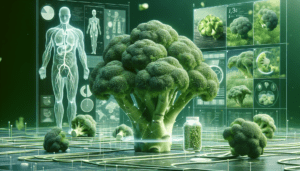Broccoli for Weight Loss
Nutritional Benefits of Broccoli
Broccoli is a powerhouse of nutrition, making it an excellent choice for those aiming for weight loss. This green vegetable is low in calories and packed with essential nutrients. A single cup of raw broccoli (approximately 90 grams) contains only 35 calories. This low-calorie count allows individuals to consume larger portions without significantly increasing their caloric intake.
| Nutrient | Amount per Cup (90g) | % Daily Value (DV) |
|---|---|---|
| Calories | 35 | – |
| Fiber | 2.2g | 8% |
| Vitamin C | 81mg | 90% |
| Vitamin K | 92mcg | 115% |
| Folate | 57mcg | 14% |
Broccoli is also rich in vitamins and minerals like Vitamin C, Vitamin K, and folate. These nutrients support overall health and well-being, making broccoli a valuable addition to any diet. For more on the nutritional value of broccoli, visit our detailed guide.
Fiber Content in Broccoli
One of the key factors that make broccoli a great choice for weight loss is its high fiber content. Each cup of raw broccoli provides 2.2 grams of fiber, which is about 8% of the daily value. Fiber is essential for maintaining good digestive health and can aid in weight loss by promoting a feeling of fullness and reducing overall calorie intake.
Broccoli contains a high amount of insoluble fiber, which takes longer to digest. This slow digestion helps in keeping one feeling full for a more extended period, thereby reducing the likelihood of overeating. Consuming broccoli 2-3 times a week can be beneficial for those looking to shed some pounds.
Broccoli’s fiber content also promotes gut health, which is crucial for effective weight management. To learn more about how broccoli aids in digestion, visit our article on broccoli and digestion.
Incorporating broccoli into a balanced diet can significantly aid in weight management and overall health. For more on the benefits of broccoli, check out our comprehensive resources.
Broccoli and Health
Vitamins and Minerals in Broccoli
Broccoli is a powerhouse of essential vitamins and minerals, making it a vital addition to a healthy diet. It is particularly noted for its high vitamin C content. Half a cup of cooked broccoli provides 84% of the reference daily intake (RDI) of vitamin C. This vitamin is crucial for the immune system, skin health, and the absorption of iron from plant-based foods.
Broccoli is also rich in vitamin A, which is essential for vision, growth, and immune function. Additionally, it contains significant amounts of vitamin K, which is important for blood clotting and bone health.
| Nutrient | Amount per 1/2 cup (78g) | % RDI |
|---|---|---|
| Vitamin C | 48mg | 84% |
| Vitamin A | 567 IU | 11% |
| Vitamin K | 92mcg | 115% |
| Folate | 57mcg | 14% |
| Potassium | 230mg | 6% |
Broccoli also provides essential minerals like potassium, which helps regulate blood pressure, and folate, which is crucial for cell function and tissue growth. For more details on the nutritional value of broccoli, visit our detailed guide.
Antioxidants in Broccoli
Broccoli is a rich source of multiple potent antioxidants, including glucoraphanin, lutein, and zeaxanthin. These antioxidants support healthy cells and tissues throughout the body. Glucoraphanin, in particular, is converted into sulforaphane during digestion, a compound known for its powerful health benefits, including anti-cancer properties.
The bioactive compounds in broccoli, such as kaempferol, a flavonoid, have been shown to reduce inflammation in the body’s tissues. This makes broccoli an excellent food choice for reducing the risk of chronic diseases.
| Antioxidant | Benefit |
|---|---|
| Glucoraphanin | Precursor to sulforaphane, supports cellular health |
| Lutein | Supports eye health |
| Zeaxanthin | Protects eye tissues from harmful light |
| Kaempferol | Reduces inflammation |
Broccoli’s leaves are particularly rich in these bioactive compounds, including vitamins A and C, dietary fiber, and phenolic compounds. Consuming broccoli has been linked to the prevention of chronic disorders such as diabetes, cancer, and cardiovascular diseases.
For more information on how these antioxidants contribute to overall wellness, visit our article on the health benefits of broccoli. Additionally, explore how broccoli aids in cancer prevention and heart health.
Broccoli’s Role in Weight Management
Broccoli in a Balanced Diet
Broccoli is an excellent addition to a balanced diet, especially for those looking to manage their weight. This cruciferous vegetable is very low in calories, providing only 35 calories per cup (90 grams). Additionally, broccoli is composed of nearly 90% water, making it a hydrating and filling component of meals.
| Nutrient | Amount per Cup (90g) |
|---|---|
| Calories | 35 |
| Fiber | 2.2g |
| Protein | 3g |
| Carbohydrates | 7g |
| Fat | 0.3g |
Broccoli is rich in fiber, with each cup offering about 2.2 grams, or approximately 8% of the Daily Value. The high fiber content promotes a feeling of fullness, which can help reduce overall caloric intake. Incorporating broccoli into meals can be particularly effective around breakfast or lunch, allowing the body ample time to digest and absorb its nutrients (Healthifyme).
For more information on the nutritional value of broccoli, visit our detailed guide.
Broccoli and Weight Loss Studies
Numerous studies have highlighted broccoli’s potential to aid in weight loss. Broccoli is low in digestible carbohydrates but provides a significant amount of insoluble fiber, which takes longer to digest and can help in maintaining a healthy weight (Healthline). The combination of low calories and high fiber makes broccoli an ideal food for weight management.
Research suggests that consuming broccoli 2-3 times a week can be beneficial for those looking to shed pounds. The vegetable’s ability to promote gut health and reduce inflammation further supports its role in weight management.
For more insights on the benefits of broccoli, explore our dedicated articles.
Broccoli’s high content of vitamins and minerals, including vitamin C, vitamin K, iron, and potassium, also contributes to its overall health benefits. These nutrients are essential for maintaining energy levels and overall well-being, which are crucial during a weight loss journey.
For more on how broccoli contributes to overall health, check out our article on the health benefits of broccoli.
By incorporating broccoli into a balanced diet and understanding its role in weight loss, individuals can harness the full potential of this nutritious vegetable. Whether enjoyed raw, steamed, or roasted, broccoli remains a versatile and beneficial component of a weight management plan.
Broccoli for Disease Prevention
Broccoli is not only a versatile and nutritious vegetable but also a potent ally in disease prevention. This section explores its role in fighting cancer and promoting heart health.
Cancer-Fighting Compounds in Broccoli
Broccoli contains several bioactive compounds that contribute to its cancer-fighting properties. One of the most notable compounds is sulforaphane, which acts against the formation of cancer by reducing oxidative stress. Sulforaphane is found in concentrations 10–100 times higher in young broccoli sprouts than in mature heads of the vegetable.
Population studies have linked a higher dietary intake of cruciferous vegetables like broccoli with a significantly reduced risk of cancer. Researchers attribute these anticancer properties to compounds such as sulforaphane and isothiocyanates found in these vegetables.
| Compound | Source in Broccoli | Potential Benefit |
|---|---|---|
| Sulforaphane | Broccoli Sprouts | Reduces oxidative stress, lowers cancer risk |
| Isothiocyanates | Broccoli Heads | Improves risk factors for disease, reduces cancer risk |
For more information on how broccoli can help prevent cancer, visit our article on broccoli and cancer prevention.
Broccoli and Heart Health
Broccoli is also beneficial for heart health. It contains bioactive compounds such as glucosinolates, phenolic compounds, and essential vitamins like A and C, which contribute to its cardiovascular benefits.
Eating a plant-based diet rich in cruciferous vegetables like broccoli has been shown to lower the risk of heart disease. Over a span of 23 years, studies have demonstrated that these dietary habits can significantly reduce heart disease risk.
Additionally, broccoli’s isothiocyanates may help lower cholesterol levels and improve overall heart health. For further insights into how broccoli supports cardiovascular wellness, check out our article on broccoli and heart health.
| Nutrient | Source in Broccoli | Cardiovascular Benefit |
|---|---|---|
| Vitamin A & C | Broccoli Leaves | Boosts heart health |
| Phenolic Compounds | Broccoli Plants | Reduces risk of heart disease |
| Glucosinolates | Broccoli Plants | Lowers cholesterol levels |
To better understand the nutritional value of broccoli and its numerous health benefits, explore our detailed guides on the benefits of broccoli and health benefits of broccoli.


